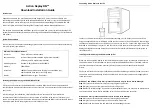
© 2015 Radiodetection Ltd
37
should be pointing away from the ground stake. If it is
not, make sure that the transmitter is connected correctly
(red connector to the cable and black to the ground
stake).
Take the dB reading and keep it for reference. If there is
a single fault on the cable, it will be approximately the
same dB value as the reference reading.
NOTE. To establish how often to take readings on the
cable or pipe, move away from the ground stake and
take further readings until the arrow has difficulty in
locking and the dB reading is low. Measure the distance
that the locator is now away from the ground stake. This
is the distance that you can safely use between taking
readings on the cable or pipe to ensure that you do not
miss the fault.
9.3 How to find a fault
Starting from the transmitter, walk along the cable or
pipe route pushing the A-Frame spikes into the ground
with the green spike pointing away from the transmitter.
Where there are no faults the dB reading will be low and
the direction arrow may flicker forward and back.
NOTE: Flickering arrows may also indicate that you may
be too far away from the fault or ground stake (or both)
for the locator to lock on.
Figure 9.1: Cable sheath fault-finding
If you are trying to locate high resistance faults or there
is a long distance between faults, carry on with the
survey and the locator will lock on when you get closer
to the fault.
Figure 9.2: Locating faults with the locator and A-frame
Take readings at the survey intervals determined by the
reference reading. To locate the cable or pipe while
using the fault find signal during a Fault-Find survey,
press the
key once and the locator will switch to Peak
locate mode. To use alternative antenna modes, press
the
key to step through available antenna modes. To
get back to fault find mode step through all available
antenna modes until the locator goes back to fault find
mode.
Note: While the A-Frame is connected to the locator,
depth and current measurements will not be available. If
depth or current measurements are required, remove
the A-Frame lead from the locator.
As a fault is approached the Fault-Find direction arrow
will lock on to the fault signal, point forward and the dB
readings will increase. When the fault is passed the
arrow will point back towards the transmitter. Take
readings at smaller survey intervals to determine the
exact point of the fault.
When the A-frame is directly over the fault the dB
reading will drop as shown opposite.
NOTE: The values given are for illustration purposes
only and may not be the same as those obtained in other
situations.
To pinpoint the fault, turn the A-frame 90° to the cable or
pipe and Fault-Find until the exact point is found. Where
the arrow direction changes the center line of the A-
frame is now directly over the fault.
Mark the ground to show the position of the fault. Find
the maximum dB reading in front of the fault by pushing
the A-frame into the ground at small intervals. Note the
dB reading. If the reading is approximately the same as
the reference reading, you can assume that there is only
one fault. If the reading is less than the reference
reading, keep surveying the cable for other faults.
NOTE: If the cable or pipe runs under a road, use the
equipment as normal on the road surface as it can
sometimes detect signals when working on blacktop,
concrete, or paved surfaces. If necessary, try wetting the
road surface. Pouring a very small amount of water
around the bottom of the A-frame spikes before each
Fault-Find will generally ensure a good ground
connection.
NOTE: If the cable or pipe runs under a paved surface,
the fault can often be pinpointed by fault finding in the
grass / soil adjacent to the paving. Reduce the distance
between placing the A-frame spikes in the ground to
allow for the increased distance to the actual fault
position.
















































